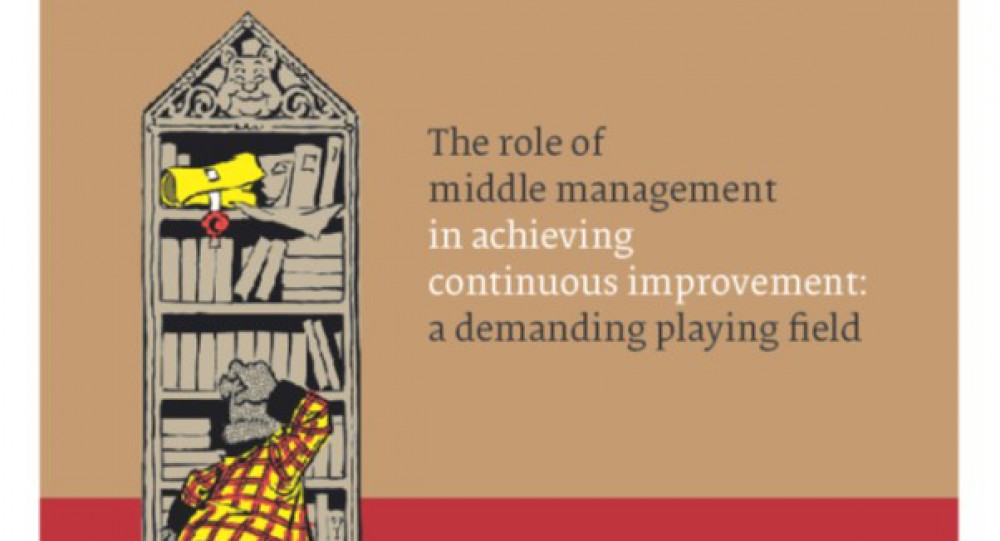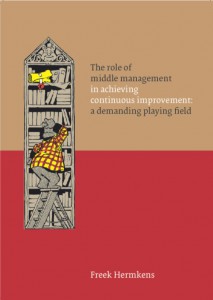Author Archives: freekhermkens
Dissertation 03-06-20
AN EXPLORATORY STUDY OF MIDDLE MANAGER’S ROLES IN CONTINUOUS IMPROVEMENT
Freek Hermkens, Sharon Dolmans, A. Georges L. Romme
Abstract
Floyd and Wooldridge have developed a widely used model regarding the middle managers’ contribution to strategic change, in which four strategic roles for middle managers are considered: championing, synthesizing, facilitating and implementing. Although there is an extensive body of knowledge about the roles and influence of middle managers in implementing strategy, insight in which roles are activated in continuous improvement (CI) initiatives is underdeveloped and highly dispersed. Therefore, in this study we seek to understand which middle management roles (i.e. championing, synthesizing, facilitating, implementing) contribute to accomplishing CI. To explore which of these roles are activated when middle managers are confronted with a CI initiative, we developed a scenario experiment. Our findings indicate that the implementing and synthesizing roles appear to be of key importance in the context of CI initiatives, while the facilitating and championing roles appear to be less relevant.
- Full Text: PDF
- DOI:10.5539/ibr.v13n5p9
A Vignette Study of Middle Managers’ Responses to Continuous Improvement Initiatives by Top Management
A Vignette Study of Middle Managers’ Responses to Continuous Improvement Initiatives by Top Management
Freek Hermkens, Sharon Dolmans, A. Georges L. Romme
Abstract
To better understand why continuous improvement (CI) initiatives often fail and do not result in sustained changes, this paper investigates how management’s conceptualization of a continuous improvement program affects its implementation via middle managers. The study serves to identify the differences in outcomes of CI initiatives arising from implementing CI as an integral management versus an efficiency-improvement approach. This research draws on a vignette study (i.e. scenario experiment) with 107 middle managers working at one of the largest financial institutions in the Netherlands. The findings arising from this study suggest that CI is more likely to be adopted into the organizational culture, enhance the customer orientation among employees and improve the work atmosphere, when it is implemented as an integral management approach rather than as an efficiency-oriented program.
Full Text: PDF
The Role of Middle Managers in Becoming Lean: A Systematic Review and Synthesis of the Literature
The Role of Middle Managers in Becoming Lean: A Systematic Review and Synthesis of the Literature
Freek Hermkens1*, Sharon Dolmans1 and Georges Romme1
1Eindhoven University of Technology, P.O.Box 513, 5600 MB Eindhoven, Netherlands.
Aims: Many organizations adopt the Lean management approach to create a culture of continuous improvement (CI), but often fail to accomplish such a change. Previous studies have explained this high failure rate in terms of poor leadership and management, including the role of middle managers. However, the body of knowledge about the role and influence of middle management in Lean CI is underdeveloped and highly dispersed. Some earlier work suggests that middle managers can both enable and hinder CI initiatives, but a systematic overview is missing. This paper provides a systematic review of the literature to develop a mechanism-based framework that explains the success and failure of CI initiatives in which middle managers are key agents. This study therefore aims to develop an evidence-based framework of key aspects of middle management roles in CI practices drawing on Lean.
Methodology: We conducted a mechanism-based systematic review of the literature. In total, 203 publications were selected and then reviewed in detail. This review focuses on how middle managers influence the implementation and success/failure of Lean CI initiatives.
Results: The review of the literature on CI/Lean and middle management results in two frameworks. Each of these frameworks assumes that top management consistently seeks to implement a particular (archetypical) philosophy of CI/Lean: the first framework assumes an integral management approach and the second one starts from the assumption that a cost-cutting strategy is adopted. Each of these two frameworks in itself reflects some of the key tensions and challenges arising from any CI/Lean change effort, especially for middle managers. In practice, the two conditions may overlap, which creates an additional level of complexity. Overall, our review provides an understanding of the (non)conditions in which continuous improvement initiatives are likely to succeed or fail, and as such also provides a starting point for future research as well as practical work in this area.
![]() Full Article – PDF Page 1-17
Full Article – PDF Page 1-17
DOI : 10.9734/JEMT/2017/38100
Webinar Middenmanagement een vloek of een zegen?
Hora Est Webinar: Leren promoveren. 19 september 2019
Webinar Hora Est! Leren Promoveren
2nd European Lean Educators Conference
Welcome to the 2nd European Lean Educators Conference!
The European Lean Educator Conference is dedicated to fostering exchange within academia as well as between education and industry, which we believe is especially important. Toward that end, we are targeting an audience that is 50 percent educators and 50 percent Lean teaching and coaching specialists from industry.
All participants will take home practical lessons-learned from one another. After many successful Lean Educator Conferences in the United States, the European conference is now in its second year and will this time take place in Södertalje, close to Stockholm. Keynote speakers, coaches and Lean implementers of leading organizations and companies will share their experience and knowledge.
Through innovative educational approaches – ranging from simulations, case studies, learning factories and new training methods – participants will receive new ideas for teaching, practicing and coaching continuous improvement.
We welcome you to Södertälje in September!


